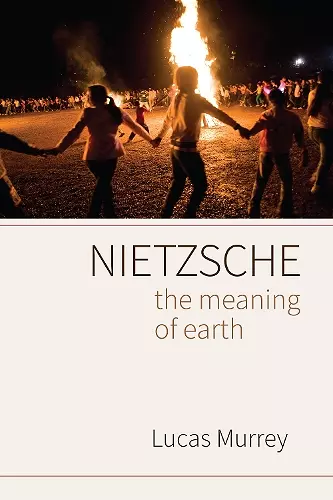Nietzsche
The Meaning of Earth
Format:Hardback
Publisher:Lehigh University Press
Published:25th Mar '15
Currently unavailable, and unfortunately no date known when it will be back

In this book, author Lucas Murrey argues that the thinking of the modern German philosopher Friedrich Nietzsche (1944–1900) is not only more grounded in antiquity than previously understood, but is also based on the Dionysian spirit of Greece which scholars have still to confront. This book demonstrates that Nietzsche’s philosophy is unique within Western thought as it retrieves the politics of a Dionysiac model and language to challenge the alienation of humans from nature and one another. Murrey develops here a new picture of Greece, reminding readers how money emerged and rapidly developed in Greece during the sixth century B.C.E. The event of monetization created the new art form of tragedy: money-tyrants struggling against the forces of earth and communities who consequently suffered isolation, blindness, and death. As Murrey points out, Nietzsche (unconsciously) retrieves the battle among money, nature, and community and adapts its lessons to our time. Additionally, Nietzsche’s philosophy not only adapts the wisdom of Dionysus to question the unlimited “glow and fuel” of a “ponderous herd” of money-tyrants today, but it also draws attention to Greece’s warnings about the lethal danger of the eyes in myth, cult, and theatre. This work introduces a much needed vision of Nietzschean thought, and it emphasizes the relevance of an interdisciplinary approach combining philosophy with literary studies and psychology with religious and visual/media studies. When applied to our present circumstance, the approach of this book reveals how a dangerous visual culture, through its support of the limitlessness of money, is harming our relationship with nature and each other.
Lucas Murrey has produced a visionary adaptation of the Nietzschean Dionysiac to illuminate the dysfunctionality of twenty-first century capitalism. -- Richard Seaford, University of Exeter, author of Money and the Early Greek Mind and Dionysus
As a new contemporary interpreter of Nietzsche, Lucas Murrey offers a critical analysis of the catastrophes that this German philosopher prophesised. In particular, Murrey's historical placement of Nietzsche that, on the one hand, looks explicitly backward to the poetry of Friedrich Hölderlin and, on the other hand, implicitly forward to the poetry of Stefan George, opens new doors of thought. -- Bernhard Böschenstein, Université de Genève, author of “Frucht des Gewitters:” Zu Hölderlins Dionysos als Gott der Revolution and Paul Celan:Der Meridian
A congenial and rigorous new landmark study regarding Nietzsche’s understanding of Dionysus in Greek tragedy during his Basel year. Well versed in classical scholarship and challenging in its original insights into ancient and modern visual culture. -- Anton Bierl, University of Basel; author of Dionysos und die griechische Tragödie
Once again, fascinating material. It is exciting to see the meaning of Orwell’s unpublished preface 'The Freedom of the Press' enter into the orbit of German philosophy. -- Noam Chomsky, Massachusetts Institute of Technology, author of Manufacturing Consent: The Political Economy of the Mass Media and Gaza in Crisis: Reflections on Israel’s War against the Palestinians
ISBN: 9781611461541
Dimensions: 236mm x 160mm x 18mm
Weight: 413g
190 pages